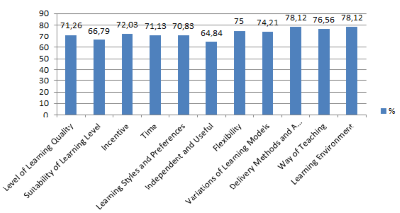The Effectiveness of Learning With Blended Learning Model in The Specification Bulding Drawing Course
Diviana Aguva, Revian Body
Abstract
This research began with the spread of the Covid-19 virus, which caused the education system that started all face-to-face learning processes to turn into a blended learning model. This study aims to determine the effectiveness of the blended learning model in the building engineering drawing course for students of the Padang State University Building Engineering Education study program. This type of research is descriptive research with a quantitative approach. This research was conducted in the Department of Civil Engineering, Faculty of Engineering, Padang State University. The sample used in this study were students of the building engineering education study program class of 2020 who had carried out a building engineering drawing course with a blended learning model as many as 32 students. The data collection technique used is by distributing research questionnaires in the form of links made on Google Forms which are then shared via Whatsapp. The data analysis technique in this research is data verification and descriptive analysis using Microsoft Office Excel and SPSS version 17.0. Based on the results of the study, the Effectiveness of the Blended Learning Model in the Building specification Drawing Course is quite effective with the Degree of Achievement (DP) of the two indicators of 71.35%. This means that the level of effectiveness in the learning process in the building construction drawing course is considered quite effective by using the blended learning model.
Keywords
Effectiveness, Blended Learning Model, Specification Building Drawing
References
Bayu Fitra Prisuna. 2021. “Efektivitas Media Pembelajaran Daring Melalui Google Meet Pada Mata Kuliah Metodologi Penelitian Kualitatif”. Jurnal Pena Edukasi (Nomor 1 Tahun 21). Hlm. 15--24.
Sara Bibi dan Handaru Jati. 2015. “Efektivitas Model Blended Learning Terhadap Motivasi dan Tingkat Pemahaman Mahasiswa Mata Kuliah Algoritma dan Pemrograman”. Jurnal Pendidikan Vokasi (Vol. 5 No. 2.). Hlm. 74--87.
Deni Darmawan dan Dinn Wahyudin. 2018. Model Pembelajaran di Sekolah. Bandung: PT. Remaja Rosdakarya.
Fazar Nuriansyah. “Efektivitas Penggunaan Media Online dalam Meningkatkan Hasil Belajar pada Mahasiswa Pendidikan Ekonomi Saat Awal Pandemi Covid-19”. Jurnal Pendidikan Ekonomi Indonesia (Nomor 2 Tahun 2020). Hlm. 61—65.
Sugiyono. 2012. Metode Penelitian Kuantitatif Kualitatif dan R&D. Bandung: Alfabeta.
Lijan Poltak Sinambela. 2014. Metodologi Penelitian Kuantitatif. Yogyakarta: Graha Ilmu.
DOI:
https://doi.org/10.24036/cived.v9i3.118696
Copyright (c) 2022 Diviana Aguva, Revian Body

This work is licensed under a
Creative Commons Attribution 4.0 International License.
PENERBIT : UNIVERSITAS NEGERI PADANG
Alamat:
Jalan Hamka Padang. Indonesia
email: sipil@ft.unp.ac.id



